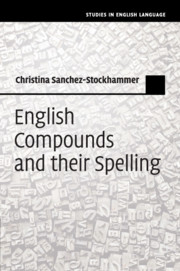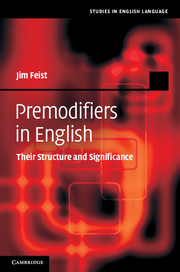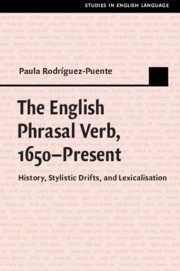English Compounds and their Spelling
£36.99
Part of Studies in English Language
- Author: Christina Sanchez-Stockhammer, Ludwig-Maximilians-Universität Munchen
- Date Published: September 2020
- availability: Available
- format: Paperback
- isbn: 9781316647905
£
36.99
Paperback
Other available formats:
Hardback, eBook
Looking for an inspection copy?
This title is not currently available on inspection
-
Anyone writing texts in English is constantly faced with the unavoidable question whether to use open spelling (drinking fountain), hyphenation (far-off) or solid spelling (airport) for individual compounds. While some compounds commonly occur with alternative spellings, others show a very clear bias for one form. This book tests over 60 hypotheses and explores the patterns underlying the spelling of English compounds from a variety of perspectives. Based on a sample of 600 biconstituent compounds with identical spelling in all reference works in which they occur (200 each with open, hyphenated and solid spelling), this empirical study analyses large amounts of data from corpora and dictionaries and concludes that the spelling of English compounds is not chaotic but actually correlates with a large number of statistically significant variables. An easily applicable decision tree is derived from the data and an innovative multi-dimensional prototype model is suggested to account for the results.
Read more- The most comprehensive account of English compound spelling so far
- Offers a spelling algorithm for English compounds that readers can use to determine the most likely spelling in cases of doubt
- Combines a theoretical and an applied approach to English compound spelling, applicable to readers from both types of background
Reviews & endorsements
'The investigation successfully explains why and how English compounds are orthographically represented … The book will therefore prove convenient mainly for researchers with an interest in morphology and the lexicon who appreciate an empirical corpus-based approach to language. These readers will readily recognise the vast majority of concepts and models discussed, and at the same time they will easily become familiarized with the new ones thanks to the clear distribution of contents, evolving from simpler to more complex. All in all, this publication is a valuable resource for anyone who wishes to understand the variables affecting compound spelling and has previous experience in corpus analysis and research.' Jesús Fernández-Domínguez, LINGUIST List
Customer reviews
Not yet reviewed
Be the first to review
Review was not posted due to profanity
×Product details
- Date Published: September 2020
- format: Paperback
- isbn: 9781316647905
- length: 418 pages
- dimensions: 150 x 230 x 25 mm
- weight: 0.59kg
- contains: 8 b/w illus. 142 tables
- availability: Available
Table of Contents
1. Introduction
Part I. Theoretical Background:
2. Delimitating the compound concept
3. The normative background
Part II. Empirical Study of English Compound Spelling:
4. Material and method
5. Potential determinants of English compound spelling
Part III. Modelling English Compound Spelling:
6. Compound spelling heuristics
7. Modelling English compound spelling
8. Summary and conclusion.-
General Resources
Find resources associated with this title
Type Name Unlocked * Format Size Showing of
This title is supported by one or more locked resources. Access to locked resources is granted exclusively by Cambridge University Press to lecturers whose faculty status has been verified. To gain access to locked resources, lecturers should sign in to or register for a Cambridge user account.
Please use locked resources responsibly and exercise your professional discretion when choosing how you share these materials with your students. Other lecturers may wish to use locked resources for assessment purposes and their usefulness is undermined when the source files (for example, solution manuals or test banks) are shared online or via social networks.
Supplementary resources are subject to copyright. Lecturers are permitted to view, print or download these resources for use in their teaching, but may not change them or use them for commercial gain.
If you are having problems accessing these resources please contact [email protected].
Sorry, this resource is locked
Please register or sign in to request access. If you are having problems accessing these resources please email [email protected]
Register Sign in» Proceed
You are now leaving the Cambridge University Press website. Your eBook purchase and download will be completed by our partner www.ebooks.com. Please see the permission section of the www.ebooks.com catalogue page for details of the print & copy limits on our eBooks.
Continue ×Are you sure you want to delete your account?
This cannot be undone.
Thank you for your feedback which will help us improve our service.
If you requested a response, we will make sure to get back to you shortly.
×






